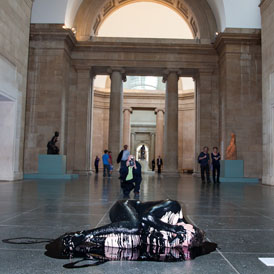BP protest: ‘Tate should come clean about dirty oil money’
One year after the Deepwater Horizon disaster in the Gulf of Mexico, activists have targeted Tate Britain’s links with BP during a week of worldwide demonstrations.
Campaigners from the activist group Liberate Tate staged a ‘live art’ demonstration inside the gallery over the Tate’s sponsorship deal with BP, the value of which is not known.
During the protest a naked member of Liberate Tate had an oil-like substance poured over him by silent figures dressed in black and wearing veils, and lay down in a foetal position on the floor in the middle of the exhibition. Gallery staff placed barriers around him and eventually escorted him out of the building.
The demonstration comes on the first anniversary of the explosion of BP’s Deepwater Horizon rig, which killed 11 workers and left 4.9 million barrels of oil pumping into the Gulf of Mexico, where it hit wildlife, coasts and fisheries.
Read More: BP Oil Spill special report
Peter McDonnell from Liberate Tate told Channel 4 News the group wished to make a powerful statement against double standards.

“This is not about highlighting the issue per se, they know what they are doing, we want to confront cultural institutions with their hypocrisy” he said
“The Tate is trying to portray itself as a liberal progressive institution while remaining in a relationship with a company that commits environmental and social atrocities,” he added.
we want to confront cultural instituions with their hypocrisy, Peter McDonnalld, Liberate Tate
Protesters say that there are also concerns about BP’s investment in polluting tar sands oil extraction in Canada, its efforts to drill in the Arctic and the contribution of fossil fuels to climate change, as well as human rights controversies.
The demonstration came on the same day a letter was published in the Guardian newspaper signed by 166 figures in the arts, including writer Naomi Klein, calling on the Tate to “demonstrate its commitment to a sustainable future by ending its sponsorship relationship with BP”.
A statement from the Tate said BP was one of the most important sponsors of the arts in the UK. “Tate works with a wide range of corporate organisations and generates the majority of its funding from earned income and private sources.
“The support that these organisations give is extremely important and allows us to deliver a hugely successful and popular programme,” the statement said.
Tate’s board adopted a sponsorship policy in 1991 and in 2008 and included an ethics policy that all donors must comply with, it said.
“BP has worked with Tate since 1990 and fits within the guidelines of this policy,” the statement continued.
Liberate Britain say that despite numerous freedom of information requests, Tate refuses to disclose details of its arrangement with BP.
“By refusing to disclose the extent of BP sponsorship, Tate is preventing the necessary public debate from taking place. It’s time it came clean about just how much dirty oil money is propping up public arts institutions,” Terry Taylor said.
Series of protests
The demonstration at the Tate is the latest in a series of protests in the past week against BP, which has faced fishermen and women protesting at their AGM over the impact of the spill on livelihoods in the Gulf and criticism from Canadian indigenous communities over the oil giant’s involvement in tar sands in Alberta.
In the US the Rising Tide Campaign group organised an ‘”nternational day of action”, involving dozens of environmental, climate, and social justice groups. They called for “aggressive protests” and civil disobedience to highlight concerns about extraction companies.
The day of action has been organised two days after 300 protesters from the Rising Tide group staged a sit in at the US Department of Interior.
The original Tate gallery, now known as Tate Britain, was named after one of its earliest benefactors, Sir Henry Tate who donated 60 paintings and paid for the gallery to be built. The current UK government has said that it is hoping to encourage similar philanthropy to provide future funding for arts organisations.




